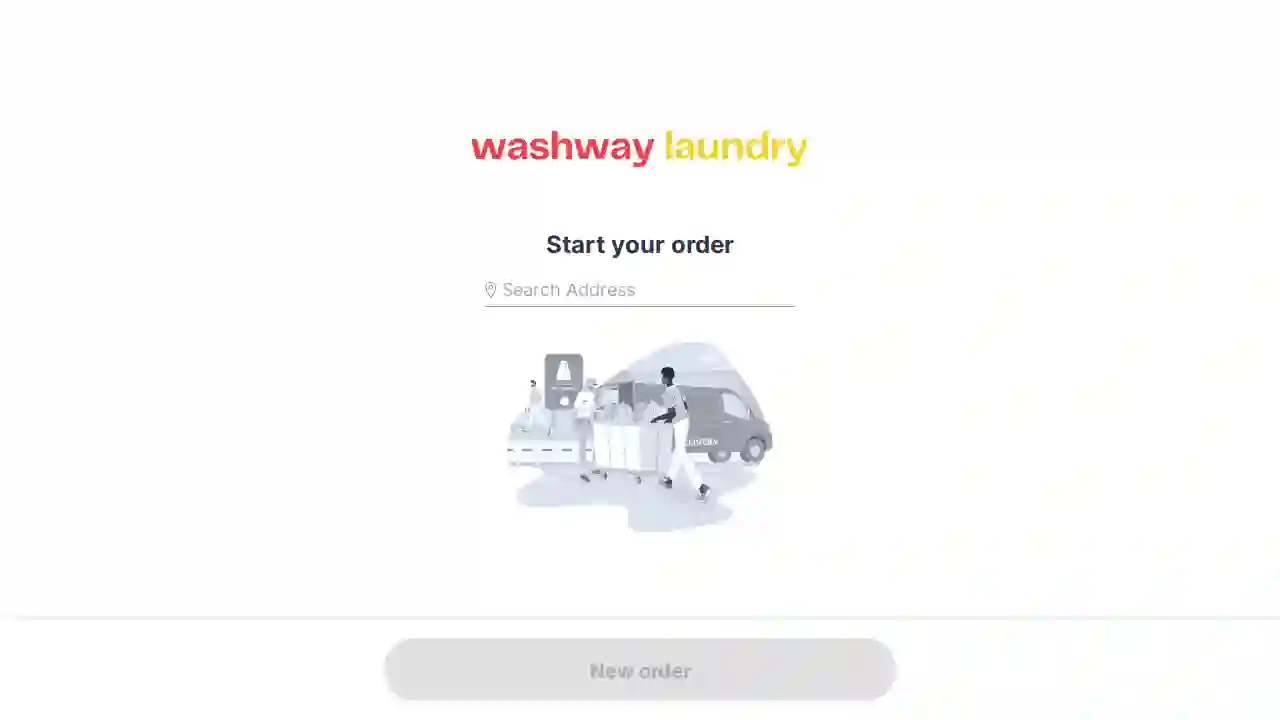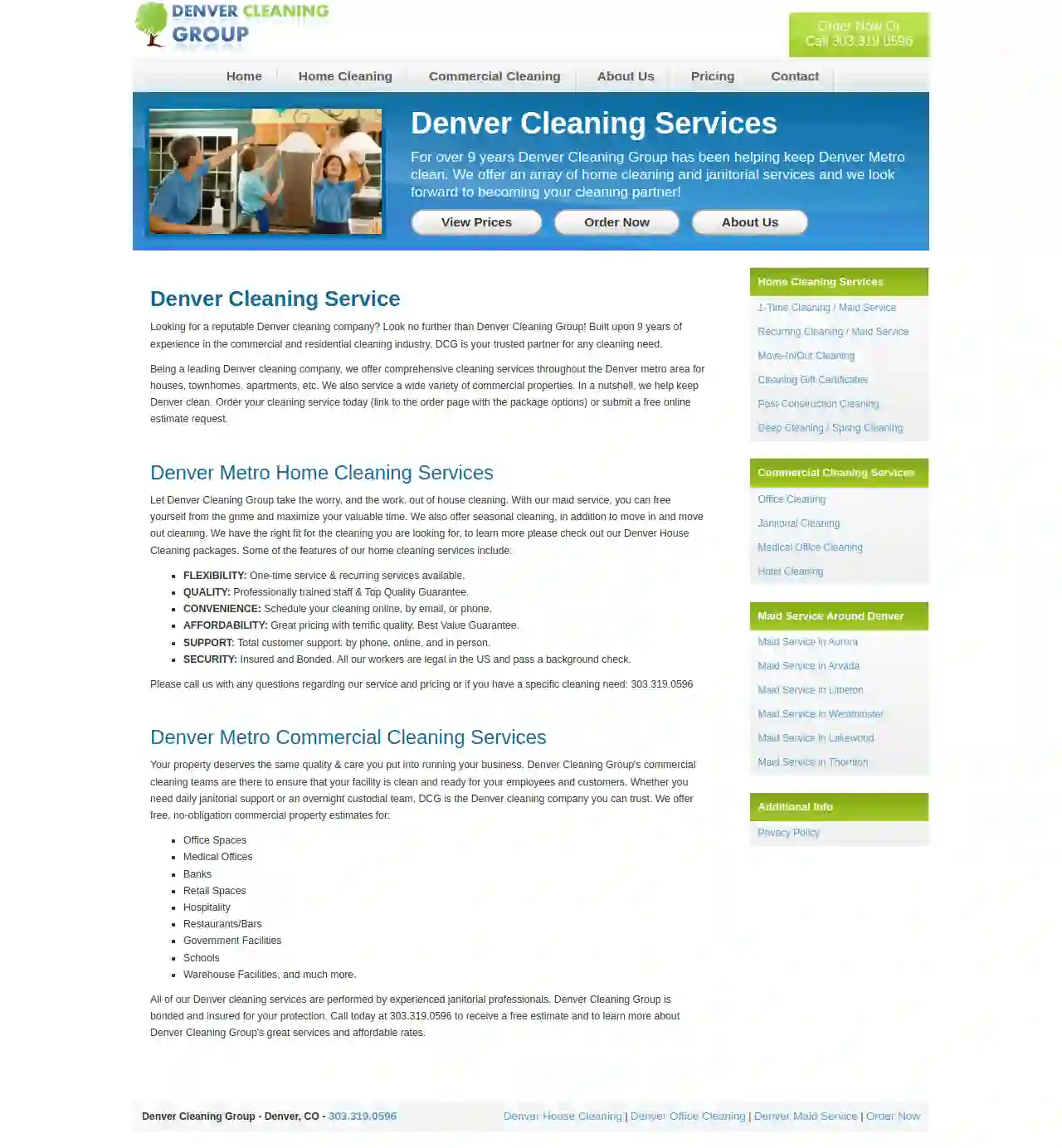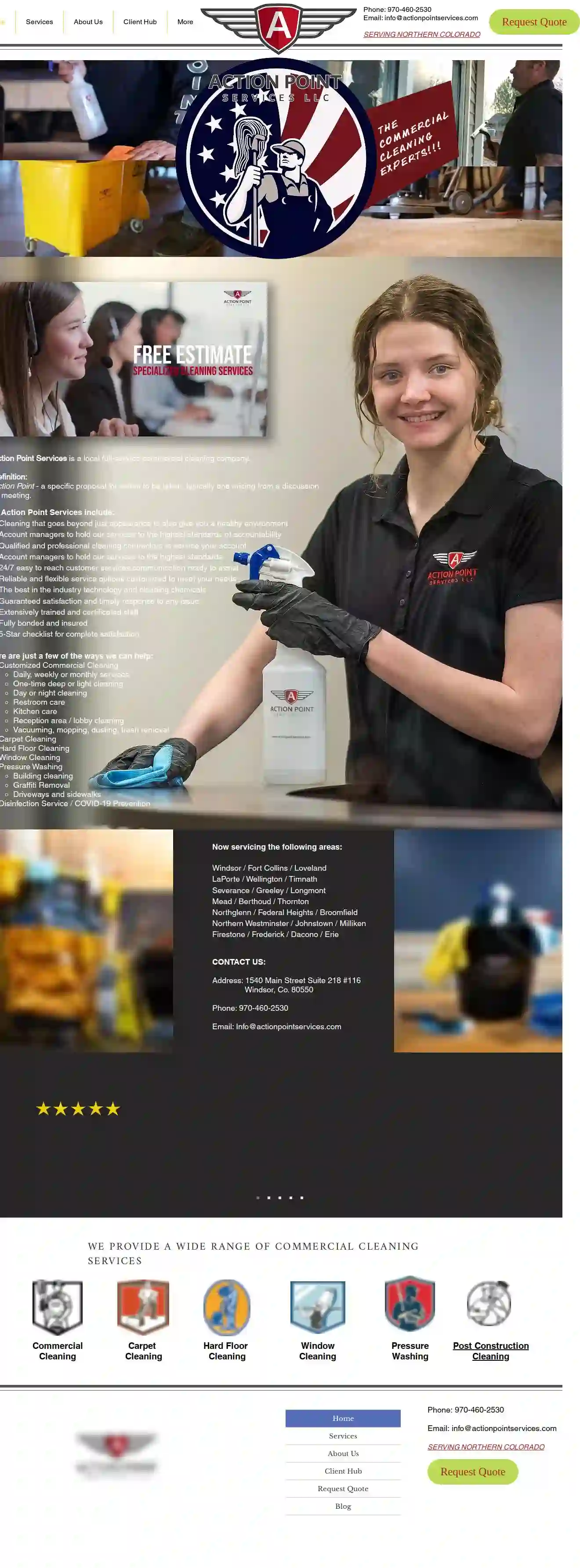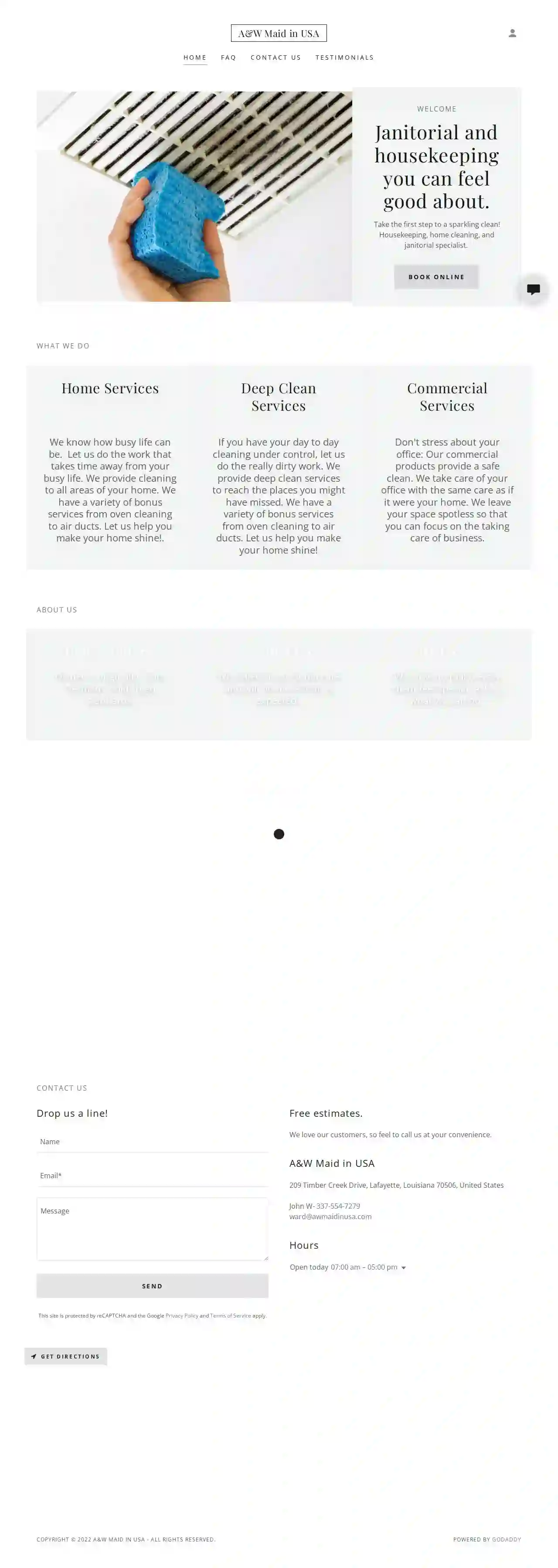Cleaning Services Security-Widefield
Find top House Cleaning in Security-Widefield
Receive multiple Local Cleaners quotes for your project today! Compare profiles, reviews, accreditations, portfolio, etc... and choose the best offer.

Simple Commercial Cleaning
4.217 reviewsDenver, US- Services
- Why Us?
- Gallery
Get Quote
American Dream Laundry
4.290 reviewsDenver, US- Services
- Why Us?
Get Quote
Denver Cleaning Service
211 reviews1234 Denver St, Suite 100, Denver, 80202, USDenver Cleaning Group is a reputable cleaning company that has been serving the Denver Metro area for over 9 years. They offer a wide range of cleaning services including home cleaning, commercial cleaning, and seasonal cleaning. Their team of experienced professionals is dedicated to providing top-quality cleaning services to ensure your property is clean and ready for your employees and customers. They are bonded and insured for your protection and offer free, no-obligation estimates for commercial properties.
- Services
- Why Us?
- Accreditations
- Our Team
- Testimonials
- Gallery
Get Quote
MAK-CLEANING LLC
5314 reviewsDenver, US- Services
- Why Us?
- Gallery
Get Quote
Austin Maintenance Service LLC
52 reviewsDenver, US- Services
- Why Us?
Get Quote
Pioneer Commercial Cleaning
Denver, US- Services
- Why Us?
- Gallery
Get Quote
Merry Maids of Lafayette
4.325 reviewsLafayette, US- Services
- Why Us?
Get Quote
PQ Cleaning Services
55 reviewsFort Collins, US- Services
- Why Us?
Get Quote
Action Point Services LLC
52 reviewsFort Collins, US- Services
- Why Us?
Get Quote
A&W Maid in USA
51 reviewsLafayette, US- Services
- Why Us?
Get Quote
Over 60,241+ Janitorial Businesses on our platform
Our janitorial contractors operate in Security-Widefield and surroundings!
CleaningMatch has curated and vetted Top Janitorial Businesses arround Security-Widefield. Find a trustworthy contractor today.
Frequently Asked Questions About Cleaning Services
- Dishes: Load the dishwasher or wash dishes by hand.
- Sink: Clean the sink with a sponge or cloth and dish soap. Pay attention to the faucet and drain. You can also use a baking soda paste to remove stubborn stains.
- Countertops: Wipe down countertops with a disinfectant cleaner or all-purpose cleaner.
- Stovetop: Clean the stovetop with a degreaser or stovetop cleaner. Remove burner grates and wash them separately if needed.
- Oven: Clean the oven according to the manufacturer's instructions. You can use a self-cleaning function or a commercial oven cleaner.
- Microwave: Clean the microwave interior with a damp cloth or sponge. For stuck-on food, heat a bowl of water with lemon juice in the microwave for a few minutes to loosen debris.
- Refrigerator: Wipe down the refrigerator shelves and drawers with a damp cloth or sponge. Remove any expired food and clean spills promptly.
- Floors: Sweep or vacuum the floor, then mop with a floor cleaner suitable for your kitchen floor type.
- Trash: Empty the trash can and recycling bin.
- Weekly: Suitable for busy households with children or pets, ensuring a consistently clean and healthy environment.
- Bi-weekly: A good option for smaller households or those who maintain a relatively clean home.
- Monthly: May be sufficient for individuals or couples who live a minimalist lifestyle.
- Quarterly or Annually: Can be suitable for deep cleaning or seasonal cleaning tasks.
- Regular Sweeping or Dust Mopping: Sweep or dust mop hardwood floors daily to remove dust, dirt, and debris.
- Vacuuming: Vacuum hardwood floors weekly using a vacuum cleaner with a hardwood floor attachment to avoid scratches.
- Damp Mopping: Damp mop hardwood floors with a hardwood floor cleaner as needed. Avoid excessive water, as it can damage the wood.
- Prevent Scratches: Place felt pads under furniture legs to prevent scratches. Avoid dragging heavy objects across the floor.
- Avoid Harsh Cleaners: Do not use harsh chemicals, abrasive cleaners, or furniture polish on hardwood floors.
- Professional Cleaning: Consider hiring a professional hardwood floor cleaning service for deep cleaning and refinishing as needed.
- Ventilation: Improve ventilation by opening windows, turning on the exhaust fan, and using a dehumidifier to reduce moisture levels.
- Bleach Solution: Mix one cup of bleach with one gallon of water. Wear gloves and eye protection when handling bleach. Apply the solution to the affected area, let it sit for 10-15 minutes, then scrub with a brush and rinse thoroughly.
- Vinegar Solution: For a milder alternative, mix equal parts water and vinegar. Apply to the moldy area, let it sit for an hour, then scrub and rinse.
- Baking Soda Paste: Make a paste of baking soda and water, apply to the moldy area, let it dry, then scrub and rinse. Baking soda helps remove stains and deodorize.
- Commercial Mold and Mildew Remover: Use a commercial mold and mildew remover according to the product instructions.
What is the most efficient way to clean a kitchen?
Regularly cleaning your kitchen helps maintain a hygienic and organized space for cooking and dining.
How often should I have my house cleaned?
You can adjust the frequency based on your needs and budget. Some people opt for weekly cleaning for high-traffic areas like kitchens and bathrooms and bi-weekly cleaning for the rest of the house.
What are some tips for cleaning hardwood floors?
By following these tips, you can keep your hardwood floors looking beautiful for years to come.
How do I remove mold and mildew from my bathroom?
Always test any cleaning solution on a small, inconspicuous area first. After cleaning, take steps to prevent future mold growth by addressing moisture issues, such as fixing leaks and improving ventilation.
What is the most efficient way to clean a kitchen?
- Dishes: Load the dishwasher or wash dishes by hand.
- Sink: Clean the sink with a sponge or cloth and dish soap. Pay attention to the faucet and drain. You can also use a baking soda paste to remove stubborn stains.
- Countertops: Wipe down countertops with a disinfectant cleaner or all-purpose cleaner.
- Stovetop: Clean the stovetop with a degreaser or stovetop cleaner. Remove burner grates and wash them separately if needed.
- Oven: Clean the oven according to the manufacturer's instructions. You can use a self-cleaning function or a commercial oven cleaner.
- Microwave: Clean the microwave interior with a damp cloth or sponge. For stuck-on food, heat a bowl of water with lemon juice in the microwave for a few minutes to loosen debris.
- Refrigerator: Wipe down the refrigerator shelves and drawers with a damp cloth or sponge. Remove any expired food and clean spills promptly.
- Floors: Sweep or vacuum the floor, then mop with a floor cleaner suitable for your kitchen floor type.
- Trash: Empty the trash can and recycling bin.
Regularly cleaning your kitchen helps maintain a hygienic and organized space for cooking and dining.
How often should I have my house cleaned?
- Weekly: Suitable for busy households with children or pets, ensuring a consistently clean and healthy environment.
- Bi-weekly: A good option for smaller households or those who maintain a relatively clean home.
- Monthly: May be sufficient for individuals or couples who live a minimalist lifestyle.
- Quarterly or Annually: Can be suitable for deep cleaning or seasonal cleaning tasks.
You can adjust the frequency based on your needs and budget. Some people opt for weekly cleaning for high-traffic areas like kitchens and bathrooms and bi-weekly cleaning for the rest of the house.
What are some tips for cleaning hardwood floors?
- Regular Sweeping or Dust Mopping: Sweep or dust mop hardwood floors daily to remove dust, dirt, and debris.
- Vacuuming: Vacuum hardwood floors weekly using a vacuum cleaner with a hardwood floor attachment to avoid scratches.
- Damp Mopping: Damp mop hardwood floors with a hardwood floor cleaner as needed. Avoid excessive water, as it can damage the wood.
- Prevent Scratches: Place felt pads under furniture legs to prevent scratches. Avoid dragging heavy objects across the floor.
- Avoid Harsh Cleaners: Do not use harsh chemicals, abrasive cleaners, or furniture polish on hardwood floors.
- Professional Cleaning: Consider hiring a professional hardwood floor cleaning service for deep cleaning and refinishing as needed.
By following these tips, you can keep your hardwood floors looking beautiful for years to come.
How do I remove mold and mildew from my bathroom?
- Ventilation: Improve ventilation by opening windows, turning on the exhaust fan, and using a dehumidifier to reduce moisture levels.
- Bleach Solution: Mix one cup of bleach with one gallon of water. Wear gloves and eye protection when handling bleach. Apply the solution to the affected area, let it sit for 10-15 minutes, then scrub with a brush and rinse thoroughly.
- Vinegar Solution: For a milder alternative, mix equal parts water and vinegar. Apply to the moldy area, let it sit for an hour, then scrub and rinse.
- Baking Soda Paste: Make a paste of baking soda and water, apply to the moldy area, let it dry, then scrub and rinse. Baking soda helps remove stains and deodorize.
- Commercial Mold and Mildew Remover: Use a commercial mold and mildew remover according to the product instructions.
Always test any cleaning solution on a small, inconspicuous area first. After cleaning, take steps to prevent future mold growth by addressing moisture issues, such as fixing leaks and improving ventilation.